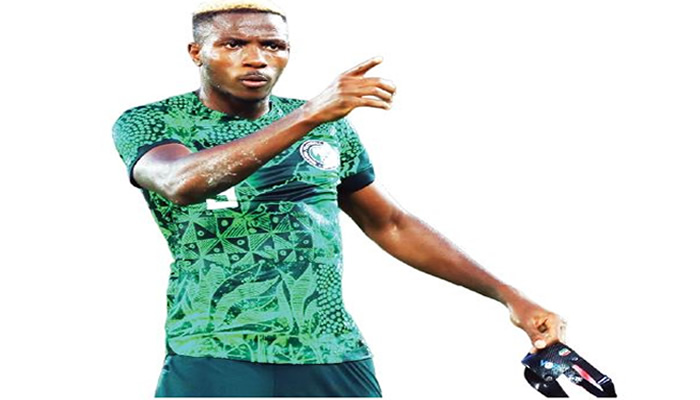Victor Osimhen, the prominent Galatasaray striker, found himself embroiled in controversy after an ankle injury sustained during Nigeria’s World Cup qualifier against Rwanda forced him to withdraw from the subsequent match against South Africa. This absence ignited a firestorm of speculation, with rumors swirling that Osimhen prioritized his club’s Champions League campaign over his national team duties. These accusations deeply affected the 26-year-old forward, impacting his morale and creating a complex psychological dilemma.
Turkish journalist Naci Küçük shed light on Osimhen’s predicament, revealing the striker’s distress over the circulating narrative. The accusations of abandoning his national team weighed heavily on Osimhen, who became preoccupied with the perception that playing through injury would only validate the claims. This internal struggle created a catch-22 situation, where playing would seemingly confirm the rumors, while his absence fueled further speculation. Küçük emphasized that this mental burden significantly impacted Osimhen’s state of mind, adding another layer of complexity to his physical recovery.
Adding fuel to the fire, a fabricated quote attributed to Ghanaian football legend Asamoah Gyan further intensified the controversy. The false quote, published by Turkish outlet Habersarikirmizi, alleged that Osimhen had exaggerated his injury to avoid international duty. This misinformation rapidly spread across social media, exacerbating tensions between Nigerian and Ghanaian football fans. Gyan swiftly debunked the fabricated quote, labeling it “fake news” on social media platform X (formerly Twitter). The outlet responsible for the misinformation subsequently issued an apology and retracted the false statement.
The incident underscores the volatile nature of online information and the potential for misconstrued narratives to escalate quickly, particularly in the emotionally charged world of international football. Osimhen’s situation became a lightning rod for speculation, highlighting the pressures faced by players balancing club and national team commitments. The controversy also revealed the vulnerability of athletes to online misinformation and the potential damage such falsehoods can inflict on their reputation and mental well-being.
Amidst the swirling controversy, medical examinations at Galatasaray confirmed the legitimacy of Osimhen’s injury, diagnosing a “moderate sprain of the ankle ligaments (with stretching and bleeding)” requiring a two-week recovery period. This medical confirmation validated Osimhen’s decision to prioritize his health and provided concrete evidence to counter the accusations of feigning injury. While he missed crucial matches for Galatasaray, including a clash against Eintracht Frankfurt in the Champions League, his return to full training signaled a positive step towards resuming his football career.
The Osimhen incident serves as a cautionary tale about the rapid spread of misinformation in the digital age and the potential consequences for individuals caught in the crossfire. It highlights the importance of verifying information before sharing it online and the responsibility of media outlets to uphold journalistic integrity. For Osimhen, the experience undoubtedly served as a challenging lesson in navigating the complexities of professional football, where public perception, media scrutiny, and the pressures of competing demands can collide to create a perfect storm of controversy. The incident underscores the need for empathy and understanding when athletes face challenging situations, recognizing that they are not immune to the emotional and psychological toll of public scrutiny and misinformation.














